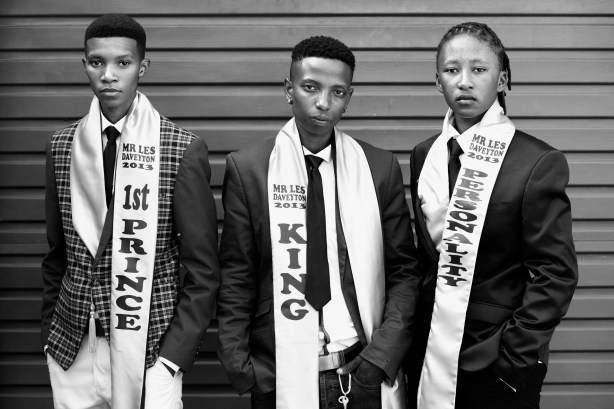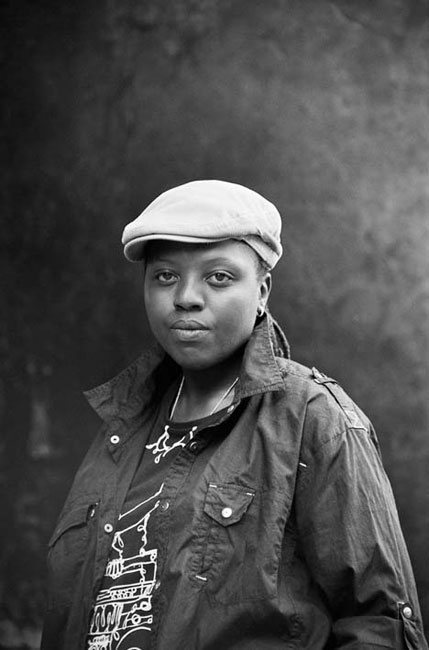There is no single smile in Zanele Muholi’s Faces and Phases 2006-14 book
The book was recently launched in Johannesburg South Africa, and is a collection of black and white portraits captured by Zanele Muholi between 2006 to 2014.
They are photographs of lesbians and transgender individuals.
The people featured are beautiful, angry, sexy, powerful, tired, educated, motivated, inspired and intriguingly unique.
The colour of their skin, love and sexual attraction places them on these pages.
These black Lesbians and Trans-wo/men come from all walks of life and from everywhere in the world, including South Africa, Sweden, Botswana, Uganda, Zimbabwe, Canada and beyond.
Some photographs are coupled with the participants’ biography, as well as stories that are; inspiring, sad, encouraging, heart breaking, and somehow a promise of a better tomorrow. While other biographies bring anger and disgust.
You need to have a strong stomach to handle the truth about the sufferings, the cruelty and love shared in the Faces and Phases pages.
In many ways, I find the book to be an empowering validation of the black wo/men’s ability to accept, overcome, exist and still love in a space where one is hated and ostracized by their own family and community, and lives in danger.

The 2013 Mr Daveyton winners. From Left – Right: Nontuthuzelo Mduba, Lebo Magaela and Nonkululeko Sharon Mthunzi.
Muholi’s friends, sisters, lovers and brothers have been maimed, raped, tortured and she could be next, just for being a different kind of a black wo/man.
Most of the featured participants agree that the justification for the inhumane actions against them, is due to the claim that their sexuality is unAfrican and evil.
Their other camaraderie is the fierce and pregnant eyes that meet yours on each page. Each pair pierces through your eyes straight to your soul as if to interrogate your core with questions you wish not hear nor answer.
This is because of the knowledge that you are inversely and otherwise responsible for the anger, vulnerability, tears, hurt, pain, numbness, distrust, blood, killings, fear, grief carried in their eyes.
Zanele has been successful in capturing deep emotions through her simple yet complex black and white photographs. The eyes of the posers uncomfortably, and it seemingly intentionally drawing you in.
After involuntarily staring at each page for some time, you cannot help but turn the page anxious to disconnect from the pain, and the drawing power of the eyes, only to be met by yet another set of eyes glaring at you with a story set apart from the previous one only by detail but similar in pain, agony, conviction and determination.
These eyes are proud but carry too many questions of why and when?
There are a few biographies contained in the book.
Some of the stories may break your heart in a thousand pieces because of the cruelty experienced by the participants, and others will make you sick to the stomach when victims talk of their experience or close encounters with being raped, friends and lovers stoned, stabbed and strangled to death by other human beings only for being different.
Its a realisation that humans can be barbaric!!
Thank God for Faces and Phases; it reconnects the human with what the world has called lesbian or gay, dyke, queer or homosexual.
Nouns that are used by the ‘world’ to disconnect and detach their horrific actions and hatred for the victim, not seeing this group of people as human beings.
The book is without any doubt a necessary and an overdue reminder of the fact that LGBTIs are born of human mothers, have brothers, sisters, cousins and uncles. That some are parents who feel, cry, bleed and have dreams for their own children. In other words, the book is a reminder that we are all the same.
My wish is for the book to be read and embraced by those outside the LGBTI community – it will change the world and diminish the harsh cruel inhumane realities experienced and feared by many.
Unfortunately, even though Zanele gave it a sanitary discrete cover, this is one of those books that will unjustifiably be judged by its cover.
Amongst the heartbreaking biographies, some of the stories carry a surprising presentation of unexpected positive words of encouragement, a sense of self love and compassion.
A perfect example for many are the words by Pearl Mbali Zulu: ‘they might swear at us as much as they want to, beat us up, rape and murder us but they won’t break our souls. Our inner beauty will remain and it will be expressed in every special way’. The words standout not because they are the first you see when you open the book but because Pearl Mbali Zulu’s biography on page 217 is poignant and inspirational and should be a message and a mantra for every girl, young and old women, homosexual and straight!
Paging deeper and deeper in the book I became a bit concerned, that Muholi only captured young people, what about the generation before this one?
Reaching page 135 was a pleasantly anticipated surprise. My eyes connected with the eyes of Nokuthula Dhladhla who seems to be in her 40s. She is a Woman of the Cloth (Pastor) that was rejected and disowned by her spiritual family and literally pushed right into the hands of a gang that raped and left her to die by the road side.
Her church at that time said it was God’s punishment to her, for being Lesbian.
She too has overcome coming eye to eye with death, to ironically continue her spiritual calling of healing and teaching about forgiveness.
It is another pleasing honour to look into the eyes of successful professionals that the world choses to see only as Lesbians or Trans – wo/men or misfits. Page 130 introduces Joyce Ndlovu – a Human Resources Administrator for a mining company in Marikana where she is surprisingly accepted and embraced by the men mineworkers predominately from rural Zulu and Xhosa land.
Unbelievably, they call her Skhokho! (affectionate expression, endearment towards someone you love and trust with your life).
Her story is a story of hope and a glimpse of what our reality can become, when we see people for who they are.
Furthermore there are photographs of human rights activists and civil society leaders; Funeka Soldaat B of Free Gender on page 110, community builders, soccer stars and traditional healers.
Thanks to this book the many phases faced by the LGBTIs are forever archived and will one day be literature increasing the understanding of generations to come.
There is not a single smile in the Faces and Phases book. I was surprised and honoured to receive a call from Zanele Muholi inviting me to the Faces and Phases Book launch.
Later, after the launch, sitting at home, paging through this unexpected, extraordinary, arresting and can’t-put-down book, I was reminded of her equally powerful and mind capturing exhibitions I have previously attended.
It is at that same moment that I realised that there’s not a single smile in the book…but at the launch…the LESBIANS WERE HAPPY!!
I think because through this Faces and Phases book, the Lesbians were, for a moment, free and safe to be.
The black women and transmen in the book make one thing clear, it is not acceptance they seek as yet, just human compassion to be allowed to just be.
The book is a real eye opener with potential to breakdown the long standing boundaries and divisions between LGBTIs and society at large. Thanks to Zanele Muholi!
She has done it again! Created photographic collection like no other and I am confident that none like this one will be achieved in our lifetime.
Once again, excellent work for humanity!!
Looking forward to the next phase.
Regards and congratulations
Kea Modise-Moloto
– Bontlebame NPO


Is there somewhere we can buy this book please? Is it available in the UK and Europe?
Wonderful blog, love what you post and saddens me that your struggles are daily ones my sisters and brothers but let yourself know you are respected and loved for what you are doing for all of us!!
I Am a newly discovered lesbian . I know that my mom has accepted that fact even though I already have two kids. I also know that some of my family members might be pretending to love me after this huge shock. But I can never trade what I am for anything else in the world. And I would like to have this book in my collection. This blog has made me very strong and to never doubt my being. Love you Zanele Muholi. You are one in a Million.
Pingback: 2015 Feb. 10: “I love you my Mom” | inkanyiso.org
Pingback: 2015 March 20: Faces and Phases book launch at UCT African Gender Institute | inkanyiso.org
Pingback: 2015 March 25: Photos from Faces and Phases book launch @ AGI – UCT | inkanyiso.org
Pingback: inkanyiso.org
Pingback: 2015 March 25: Connections rekindled at the Cape Town reunion | inkanyiso.org
Pingback: 2015 March 26: Four generations of black lesbians at the Faces and Phases book launch | inkanyiso.org
Pingback: 2016 April 27: Re/Uniting with Faces and Phases on Freedom Day | inkanyiso.org